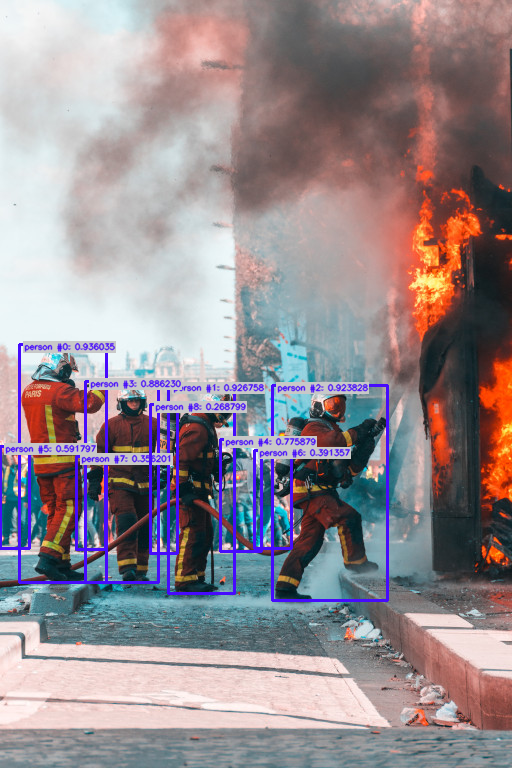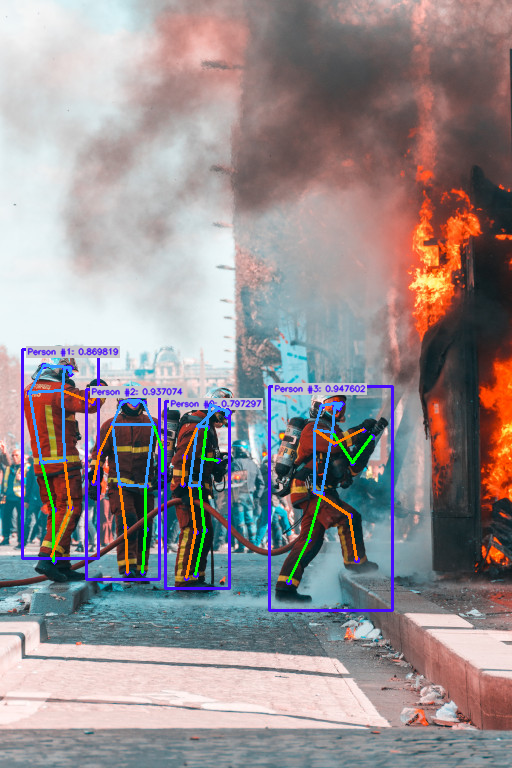
Welcome to Ikomia, where we transform intricate research algorithms into user-friendly, deployable solutions for computer vision enthusiasts and professionals alike.
🌟 Why Choose Ikomia?
-
Research Meets Reality: We bridge the gap between cutting-edge research and real-world applications. With Ikomia, you get access to algorithms from renowned sources like OpenCV, Detectron2, OpenMMLab, and Hugging Face.
-
Unified Framework: Say goodbye to integration complexities. Craft workflows and blend algorithms seamlessly, all under one roof.
-
Empowerment: We're not just about providing tools; we're about building a community. By democratizing AI and computer vision technologies, we aim to foster collaboration and innovation.
🚀 Getting Started
Installation
pip install ikomiaQuick Examples
Object Detection
from ikomia.dataprocess.workflow import Workflow
from ikomia.utils.displayIO import display
wf = Workflow()
yolov7 = wf.add_task(name="infer_yolo_v7", auto_connect=True)
wf.run_on(url="https://raw.githubusercontent.com/Ikomia-dev/notebooks/main/examples/img/img_fireman.jpg")
display(yolov7.get_image_with_graphics())


Pose Estimation
# ... [similar imports]
wf = Workflow()
pose_estimation = wf.add_task(name="infer_mmlab_pose_estimation", auto_connect=True)
wf.run_on(url="https://raw.githubusercontent.com/Ikomia-dev/notebooks/main/examples/img/img_fireman.jpg")
display(pose_estimation.get_image_with_graphics())


Discover with 'ik'
Our auto-completion system, 'ik', is designed to assist developers in discovering available algorithms in Ikomia HUB. Dive into our detailed documentation to explore its capabilities.
from ikomia.dataprocess.workflow import Workflow
from ikomia.utils import ik
from ikomia.utils.displayIO import display
wf = Workflow()
yolov7 = wf.add_task(ik.infer_yolo_v7_instance_segmentation(), auto_connect=True)
# wf.run_on(path="path/to/your/image.png")
wf.run_on(url="https://raw.githubusercontent.com/Ikomia-dev/notebooks/main/examples/img/img_dog.png")
display(yolov7.get_image_with_graphics())
display(yolov7.get_image_with_mask())
display(yolov7.get_image_with_mask_and_graphics())
📦 Exporting Your Workflow
With Ikomia, sharing your crafted workflows is a breeze. Whether you want to collaborate with peers or integrate with Ikomia STUDIO, our export feature has got you covered.
from ikomia.dataprocess.workflow import Workflow
from ikomia.utils import ik
wf = Workflow("Instance Segmentation with YOLOv7")
yolov7 = wf.add_task(ik.infer_yolo_v7_instance_segmentation(), auto_connect=True)
filter_task = wf.add_task(ik.ik_instance_segmentation_filter(categories="dog", confidence="0.90"), auto_connect=True)
wf.save("path/to/your_workflow.json")Once you've exported your workflow, you can easily share it with others, ensuring reproducibility and collaboration.
🧪 Notebooks
You can find some notebooks here.
| We provide some Google Colab tutorials: Notebooks | Google Colab |
|---|---|
| How to make a simple workflow | |
| How to run Neural Style Transfer | |
| How to train and run YOLO v7 on your datasets | |
| How to use Detectron2 Object Detection |
📚 Comprehensive Documentation
For those who love details, our comprehensive documentation is a treasure trove of information. From basic setups to advanced configurations, we've got you covered.
🤝 Contributing
We believe in the power of community. If you have suggestions, improvements, or want to contribute in any way, we're all ears! Stay tuned for our detailed contribution guidelines.
📜 License
We believe in open-source. Ikomia is licensed under the Apache-2.0 License, promoting collaboration with transparency.
💖 Support & Feedback
Your feedback drives our progress. If you find Ikomia useful, give us a :star:! For queries, issues, or just to say hi, drop us an email at team@ikomia.com or join our discord channel.
They like us, we love them :heart_eyes:
Star History
Citing Ikomia
If you use Ikomia in your research, please use the following BibTeX entry.
@misc{DeBa2019Ikomia,
author = {Guillaume Demarcq and Ludovic Barusseau},
title = {Ikomia},
howpublished = {\url{https://github.com/Ikomia-dev/IkomiaAPI}},
year = {2019}
}





